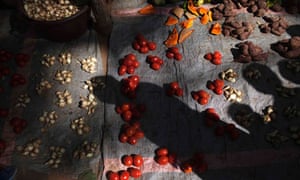Food Cultivation/Animal Herding Competition in Africa
"There are going to be some serious food-security issues."
"More and more countries will be reliant on food imports. You'll increasingly see the international community come into more rescue-type situations."
Zachary Donnenfeld, researcher, Institute for Security Studies, South Africa
| Quora Africa's land mass is slightly bigger than the U.S., China, India, the U.K., Japan, Eastern Europe, Italy, Germany, Switzerland, Spain, France, Belgium, Portugal, the Netherlands and a few other countries put together. |
Africans traditionally involved themselves in agriculture. Small-scale farming has produced foods on tracts of arable land that has succeeded in the past in serving the continent's needs in feeding its populations. Agricultural pursuits represent seventy percent of Africa's lifestyle, a percentage higher than what is seen n any other continent, according to the World Bank, with an average farm size of less than a hectare. In some areas, small-scale farming is reduced to a parcel of land comparable to the size of a tennis court.
Because of the intensity of the farming, the land is never given a rest, allowed to lie fallow for soil nutrients to be replenished. The result is that in many areas the soil becomes so compacted and dry it is nutrient-exhausted to the point where even when the weather cooperates with sufficient rain, crop harvests are utterly dismal. An emerging complicating factor is the growing tendency of herd animals where grasslands are grazed down to the nub, with nothing left to grow, apart from growing desertification.
 |
| International Development Research Centre |
As Africans become more wealthy they are more demanding with their newfound affluence, in their diets, wanting more meat and in the process consuming greater amounts of energy and water, growing the pressures on an already-depleted land source. The demand for beef in Kenya and the prevalence of cows has increased by 60 percent, all driving a need for grazing lands. The result is overgrazing leaving large areas of bare earth. Competition between farmers and herders is continually intensifying.
Resulting in violent raids by herders carrying weapons on ranches, killing farmers, looting their homes and destroying their belongings, including the homes. Food prices increase with the strain on availability. Small landholders can no longer afford to maintain their land; facing eviction as large commercial farms begin to move in, leading to conflict in places like Malawi. Housing tracts and shopping centres are also displacing farmland.
Where areas are set aside as wildlife preserves, in responsible management of protected wildlife areas, farmland is further cut away. Fertile land has been identified by scientists but that land is located in rainforests where, if the trees are cut down to make way for farming, serious consequences will most certainly arise as the environment becomes more vulnerable to degradation and climate change proceeds.
 |
| Tomatoes for sale in the central market in Mali, 2013. Could sustainable intensification increase crop yields in Africa? Photograph: Joe Penney/Reuters |
North of Nairobi there is a natural stage setting encompassing all of the challenges featured across the continent, with a mix of herders, landowners, farmers, cattle ranchers, tour operators, wildlife activists, elephants, lions, hyenas, cows, goats and zebra, competing in a narrow, crowded geography for the space they all need. An estimated eighty people have been killed in violence so far this year when herders have attacked. And nor are police officers dispatched to maintain order safe from the violence; they too are under attack, ambushed, their weapons taken.
Young men herding animals move in groups carrying AK-47 assault rifles to invade farms and ranches, herding thousands of underfed ragged cows out of drought-stricken areas in search of pasturage. Ranches on their way come under siege, with police responding using military grade mortar rounds on the invaders. The herders and the ranchers and he police lose their lives over their challenges of the land they all compete for.
Soldiers in bulletproof cars and Humvees dispatched to respond by the government, view such areas as "dangerous and disturbed".
Labels: Africa, Agriculture, Cattle, Conflict

<< Home